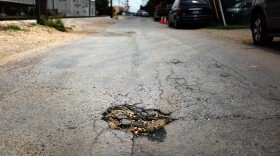Late last week, the number of traffic fatalities surpassed the total number of fatalities on Austin roads in all of last year. Currently, there have been 65 deaths with five months left in the year, compared to 63 in all of 2014. The previous peak for traffic fatalities over last few decades was in 2012, when the city saw 78 road deaths, but, this year, Austin is on track to exceed 100 deaths before the end of the year.
Below, you can view a map of the traffic deaths so far this year.
Traffic safety advocate Nic Moe made the map on his own using city data to help reveal any particular patterns in the potentially record-breaking number of road deaths.
Moe is a member of the Pedestrian Advisory Commission and he’s also a member of the city’s Vision Zero Task Force, a group that’s working on policy recommendations to the City of Austin with the goal of, as its name suggests, reducing traffic fatalities to zero. While creating the map, Moe found fatalities are widespread – every council district has experienced a death this year – and that the majority of the deaths have occurred at night. Additionally, a lot of the deaths have occurred on high-speed roadways in low-income areas – a trend that’s not unique to Austin – and nearly a third of all deaths have been pedestrian deaths.
While the map provides insight to the incidents so far this year, there’s no silver-bullet-answer that can explain the high number of deaths this year.
“A lot of people are talking about infrastructure, but infrastructure hasn’t really changed since last year. They talk about enforcement [being] different, but enforcement, again, hasn’t really changed since last year,” Moe says. “There have been actually fewer DWI arrests year-to-date than there were this time last year. So, it’s kind of hard to exactly figure out why all these extreme events are occurring.”
Last year, 64 percent of all traffic fatalities involved drug or alcohol impairment. So far this year, about 50 percent of all of them have involved impairment, according to APD.
The Vision Zero Task Force is expected to submit its policy recommendations to the Austin City Council by November.




